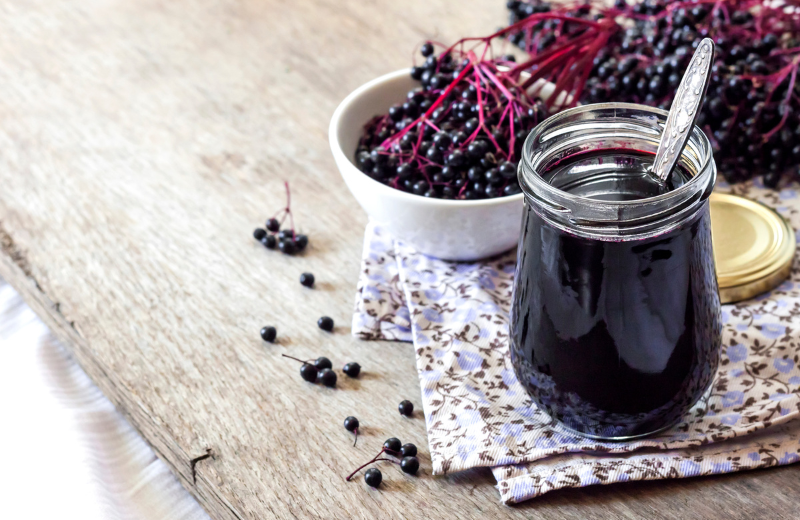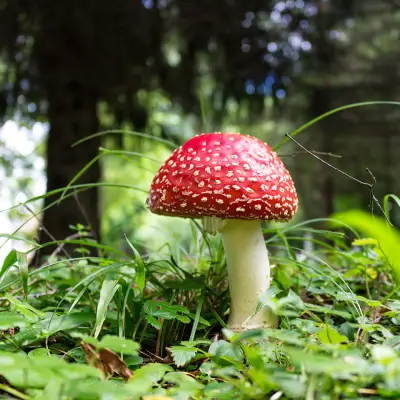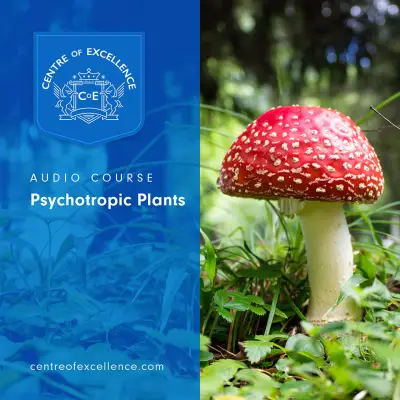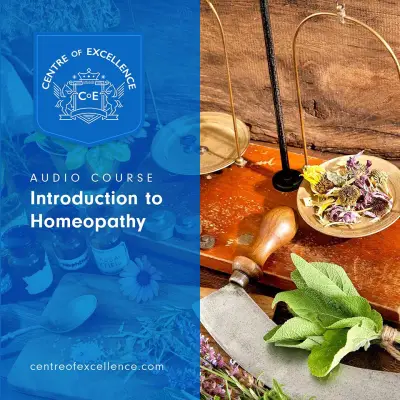From syrups and teas to capsules and gummies, elderberry is a great option for individuals seeking to boost their immune system, ward off colds, or simply feel healthier. But what is elderberry really all about? And, more importantly, is it right for you?
This guide provides an in-depth look at everything you need to know about elderberry, including its uses, health benefits, various forms, and potential side effects.
This article is for informational purposes only and is not a substitute for professional medical advice, diagnosis, or treatment. Always consult with your GP or a qualified healthcare professional before starting any new herbal remedies, especially if you are pregnant, breastfeeding, taking medication, or managing a health condition.
Jump to:
- What is Elderberry?
- The Benefits of Elderberry
- What Types of Elderberry Can You Take?
- What is the Best Form of Elderberry to Take?
- How Much Elderberry Should You Take, and When?
- What Are the Side Effects of Elderberry?
- Who Should Avoid Elderberry?
- Is Elderberry Safe for Long-Term Use?
- Other Common Questions About Elderberry
- Study Our Master Herbalist Diploma for £29
Recommended for you!
Best SellersWhat is Elderberry?
Elderberry refers to the dark purple berries from the Sambucus tree, particularly Sambucus nigra, commonly known as black elderberry. This plant has been used historically in folk medicine, particularly across Europe and North America, to treat cold and flu-like symptoms.
The definition of elderberry supplements is concentrated forms of elderberry, made into capsules, liquids, powders, or teas to make the plant's properties more accessible and convenient to use.
It’s worth noting that raw elderberries (as well as the leaves and stems) can be poisonous when eaten uncooked. Always choose processed and commercially prepared elderberry products to avoid health risks.
The Benefits of Elderberry

Elderberry has gained a strong reputation for its wide range of wellness benefits, backed by both traditional herbal use and emerging scientific studies. From supporting your immune system to promoting heart and digestive health, elderberry offers a natural way to enhance your overall wellbeing.
Immune Support
The most well-known benefit of elderberry is its immune-boosting potential. Elderberry supplements are often used during cold and flu season, and some studies suggest they may reduce the duration and severity of symptoms. That’s why sambucus elderberry benefits are often linked to viral infections like influenza.
Its antiviral properties are believed to block viruses from entering and replicating in the body’s cells. Regular use during winter months or stressful periods may help your body stay more resilient against common bugs.
Rich in Antioxidants
Black elderberry is packed with antioxidants, especially anthocyanins, which help protect your cells from damage caused by free radicals. This contributes to health benefits such as inflammation reduction and improved cellular health.
Antioxidants also play a role in slowing down the signs of ageing and supporting overall vitality. Including antioxidant-rich supplements like elderberry in your routine can support long-term wellness and disease prevention.
Female Health Support
When it comes to elderberry’s benefits for women, its antioxidant and anti-inflammatory properties may support hormonal balance, skin health, and possibly menstrual comfort. Though more research is needed, many women turn to elderberry for its general wellness effects.
Some herbalists suggest that elderberry may ease mood swings and fatigue linked to the menstrual cycle. Additionally, its skin-supporting nutrients may contribute to a clearer, more balanced complexion.
Heart and Gut Health
While not often the headline, elderberry may benefit your heart by helping to manage cholesterol and blood pressure levels. There's also emerging discussion around elderberry and gut health—some believe it may help support digestion and reduce inflammation in the digestive tract.
Its fibre content and antioxidant compounds may work together to encourage a healthy gut environment. Early research suggests it could contribute to better nutrient absorption and smoother digestion over time.
Potential Weight Management
Although elderberry is not a weight-loss miracle, its natural diuretic properties and antioxidant effects may play a supportive role in weight management. Some users have claimed that elderberry helps them feel more energised, which may aid active lifestyles.
Its potential to reduce water retention and support metabolic processes could provide some assistance in maintaining a healthy weight. When combined with a balanced diet and exercise, elderberry can complement your wellness routine.
What Types of Elderberry Can You Take?
Elderberry supplements are available in plenty of forms, giving you flexibility based on your wellness goals and lifestyle preferences.
You can choose from syrups, capsules, gummies, teas, powders, tinctures, and combination formulas. Some formats are especially popular for immune support, while others offer a more soothing or convenient option to incorporate into your daily routine.
What is the Best Form of Elderberry to Take?

- Elderberry Syrup: Elderberry syrup is one of the most well-loved and traditional forms of elderberry. It’s often used for immune support and is especially popular with families, thanks to its pleasant taste and ease of use. This form is ideal during cold and flu season and can be taken on its own or mixed with warm drinks.
- Capsules: Capsules offer a convenient and measured way to supplement with elderberry. They’re easy to travel with, require no refrigeration, and allow for consistent daily dosing. Capsules are ideal for those who prefer a no-fuss approach without any flavour or sweeteners.
- Gummies: Gummies provide a tasty and enjoyable alternative, often favoured by children. They typically come in fruit-flavoured varieties and can include added nutrients such as vitamin C or zinc. This form is suitable for those who prefer a chewable option and want to combine multiple immune-supporting ingredients in one.
- Teas: Elderberry tea benefits include warmth, hydration, and gentle immune support. This form is perfect for soothing comfort during colder months or when you're feeling under the weather. Teas often blend elderberry with other herbs for added wellness benefits and a relaxing experience.
- Powders: Powders give you the flexibility to mix elderberry into smoothies, yoghurt, or other recipes. This form allows for customisable dosing and is a good option if you’re integrating elderberry into a broader nutritional plan. It’s ideal for people who prefer natural foods and enjoy crafting their own wellness drinks or snacks.
- Tinctures: Tinctures are liquid extracts, often alcohol-based, that are taken in small doses under the tongue or mixed with water. They offer rapid absorption and are especially helpful for those looking for a more potent and concentrated form. Tinctures are often used by those familiar with herbal remedies and looking for a strong, fast-acting option. Discover how to make your own Herbal Tinctures.
- Combination Formulas: Some elderberry products are blended with other ingredients like vitamin C, zinc, or echinacea to provide a well-rounded immune boost. These blends are suitable for people who want a comprehensive supplement targeting multiple areas of health, including immunity, energy, and recovery. They’re also useful for simplifying your routine by reducing the number of separate supplements you need to take.
Regardless of the form you choose, make sure to select high-quality elderberry supplements made from black elderberry (Sambucus nigra). Look for trusted brands that standardise their products and use careful processing methods to retain the potency and safety of the elderberry extract.
How Much Elderberry Should You Take, and When?
The typical dosage of elderberry ranges from 150mg to 600mg per day, depending on the specific product, its concentration, and your reason for taking it. Lower doses are commonly used for general wellness and preventative immune support, while higher doses may be recommended during illness or periods of stress.
It’s usually advised to start with a lower dose, especially if you’re new to elderberry, and increase as needed. Elderberry is often taken in the morning to align with your body’s natural rhythm and support daytime immunity and energy. However, it can also be taken at night, particularly if you're using it for recovery or to ease symptoms during a cold.
For consistent immune support, daily use during high-risk times (such as winter months or travel) may be helpful. When using elderberry for short-term support during illness, follow the product's instructions and reassess usage after symptoms improve.
What Are the Side Effects of Elderberry?

Common side effects of elderberry are generally mild and occur mostly when the supplement is taken in large doses or for extended periods. Most people tolerate elderberry well, but some may experience:
- Digestive discomfort, such as nausea, gas, or diarrhoea
- Headaches
- Allergic reactions, including rash or itching
- Mild fatigue or dizziness in rare cases
Ingesting raw or improperly prepared elderberries (including leaves, stems, and unripe berries) can be poisonous and may cause more serious symptoms such as vomiting or severe stomach cramps. Always use properly processed elderberry products from reputable sources to ensure safety.
Who Should Avoid Elderberry?
People with autoimmune diseases should avoid using elderberry unless advised by a healthcare professional, as it may stimulate the immune system and worsen symptoms. This includes conditions such as lupus, rheumatoid arthritis, and multiple sclerosis. Additionally, those taking immunosuppressants or medications that affect immune function should exercise caution due to possible interactions.
Pregnant or breastfeeding women and children under the age of five should also consult a doctor before taking elderberry, as there is limited safety data for these groups.
Is Elderberry Safe for Long-Term Use?
Short-term use of elderberry is generally considered safe for most healthy adults. However, the long-term effects of daily supplementation have not been studied extensively. To minimise the risk of side effects and maintain its effectiveness, it’s often advised to use elderberry in cycles, such as during flu season or periods of stress, rather than taking it continuously year-round. Taking regular breaks can help you assess your body’s response and avoid overuse.
Recommended for you!
Best SellersOther Common Questions About Elderberry
What Symptoms Does Elderberry Treat?
Traditionally, elderberry has been used to treat:
- Cold and flu symptoms
- Sinus infections
- Minor inflammation
- Fever
It’s not a cure, but rather a supportive supplement. People often turn to it at the first sign of illness to help the body respond more quickly and comfortably.
Is Elderberry Bad for the Liver or Kidneys?
There’s currently no strong evidence suggesting that elderberry harms the liver or kidneys in healthy people. However, if you have pre-existing liver or kidney conditions, consult a healthcare professional first. It’s always wise to monitor how your body reacts, especially if you take elderberry frequently or in high doses.
Does Elderberry Interact with Any Medications?
Elderberry may interact with medications that affect the immune system, such as immunosuppressants. It may also influence diuretics or diabetes medications. Because of this, it’s important to review any herbal supplements with your doctor to avoid unwanted interactions.
Are Elderberry Supplements Worth It?
While not a miracle cure, elderberry can provide immune support, particularly during cold seasons. It’s a valuable addition to natural wellness routines, especially when paired with healthy lifestyle habits.
What Shouldn't You Mix with Elderberry?
Avoid combining elderberry with:
- Immunosuppressants
- High doses of laxatives
- Other immune-boosting herbs, unless guided by a professional
Mixing multiple immune stimulants without guidance may lead to overstimulation or unexpected side effects, so caution is advised.
Can I Take Zinc and Elderberry?
Zinc and elderberry work well together. Many immune support formulas combine the two, along with vitamin C, to create a more comprehensive supplement. This combination may help enhance your body’s ability to fight off seasonal illnesses.
Does Elderberry Give You Energy?
While not a stimulant, some people report feeling more energised when using elderberry regularly. This could be due to fewer colds, better sleep, or general wellness improvements. Supporting your immune system may naturally lead to better energy levels over time.
Is Elderberry Good for Your Bowels?
Elderberry has a mild laxative effect, so it may help with occasional constipation. However, excessive use could lead to diarrhoea, so it’s best taken in moderation. Those with sensitive stomachs may want to start with a lower dose and assess tolerance.
Study Our Master Herbalist Diploma for £29
If you’ve found yourself fascinated by the potential of elderberry and other natural remedies, why not deepen your understanding? Whether you're a beginner or looking to expand your knowledge, Centre of Excellence offers a comprehensive Master Herbalist Diploma Course, designed for people of all levels.
The course covers everything from herb identification and preparation to building herbal blends for specific emotional and physical needs. Follow the link to access the course for just £29!













